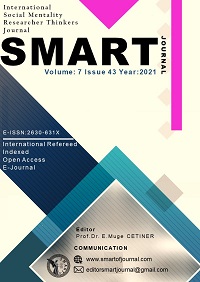Author :
Abstract
Tümevarımsal akıl yürütme özel durumlardaki ilşkilerden yararlanarak genel durum hakkında çıkarımda bulunma, varsayımlarını doğrulamayı içeren bir süreçtir. Bu çalışmanın amacı ortaöğretim öğrencilerinin tümevarımsal akıl yürütme sürecini incelemektir. Çalışmanın katılımcılarını 9, 10, 11 ve 12. sınıfa devam eden 188 ortaöğretim öğrencisi oluşturmaktadır. Veriler gönüllü öğrencilerden yazılı olarak toplanmıştır. Verilerin analizinde içerik analizi yapılmıştır. Toplanan veriler tümevarımsal akıl yürütme aşamalarına (gözlemleme, gözlemlerin organizesi, yordama, yordamanın testi, genelleme, genellemenin testi) göre incelenmiştir. Bu aşamalara göre sınıf düzeyi temele alınarak frekans ve yüzde tabloları oluşturulmuştur. Bu sayede hem aşamalar arasında hem de sınıflar arasında karşılaştırmalar yapılmıştır. Elde edilen bulgular yordamanın testi ve genellemenin testi aşamalarını öğrencilerin daha az sergilediğini göstermiştir. Ayrıca şekil verilmeyen sorularda başarının daha düşük olduğunu göstermiştir.
Keywords
Abstract
Inductive reasoning is a process that involves making inferences about the general situation and verifying its assumptions by using the relations in special situations. The aim of this study is to examine the inductive reasoning process of secondary school students. Participants of the study consist of 188 secondary school students attending the 9th, 10th, 11th and 12th grades. The data were collected in writing from volunteer students. Content analysis was made in the analysis of the data. The collected data were analyzed according to the stages of inductive reasoning (observation, organization of observations, prediction, test of prediction, generalization, test of generalization). According to these stages, frequency and percentage tables were created based on the class level. In this way, comparisons were made both between stages and between classes. The findings obtained showed that students exhibited less of the test of the prediction and the test of generalization. It also showed that success was lower in unformed questions.
Keywords
- Allen, L. G. (2001) “Teaching Mathematical Induction: An Alternative Approach”. Mathematics Teacher,
- Allen, L. G. (2001) “Teaching Mathematical Induction: An Alternative Approach”. Mathematics Teacher, 94, 500-504.
- Almeida, D. (2001). Pupils' Proof Potential, International Journal of Mathematical Education in Science and Technology, 32 (1), 53-60, DOI: 10.1080/00207390119535.
- Bardelle, C. (2009). Visual Proofs: An Experiment. V. Durand-Guerrier et a (Dü.), Annual meeting CERME6 (s. 251-260). Lyon: INRP.
- Burton, L. (1984). Mathematics thinking: The struggle for meaning. Journal for Research in Mathematics Education, 15(1), 35-49.
- Burns, M. (2000). About Teaching Mathematics A-K 8 research. California: Math Solutions Publication.
- Moguel, L.E.S., Landa,E.A.& Cabañas-Sánchez, G. (2019) Characterization of Inductive Reasoning inMiddle School Mathematics Teachers in a Generalization Task. Internatıonal Electronıc Journal Of Mathematıcs Educatıon e-ISSN: 1306-3030. 2019, Vol. 14, No. 3, 563-581.
- Cañadas, M. C. (2007). Descripción y caracterización del razonamiento inductivo utilizado por estudiantesde educación secundaria al resolver tareas relacionadas con sucesiones lineales y cuadráticas. Granada: Universidad de Granada. (Available at http://cumbia.ath.cx/mcc.htm)
- Cañadas, M. C., & Castro, E. (2007). A proposal of categorisation for analysing inductive reasoning. PNA, 1(2), 67-78. (Available at ww.pna.es)
- Cañadas, M. C., J. Deulofeu, L. Figueiras, D. Reidand A. Yevdokimov. (2008). “TheConjecturingProcess: Perspectives in Theoryand Implications in Practice”. Journal of Teachingand Learning, 5 (1), 55-72
- Canadas, M. C., & Castro, E. (2009). Using a Model to Describe Students’ Inductive Reasoning in Problem Solving. Electronic Journal of Research in Educational Psychology. 7(17): 261-278.
- Harel, G., & Sowder, L. (1998). Students' Proof Schemes. Research On Collegiate Mathematics Education, Vol. III. In E. Dubinsky, A. Schoenfeld, & J. Kaput (Eds.), AMS, 234-283
- Harel, G., & Sowder, L. (2007). Toward Comprehensive Perspectives on Learning and Teaching Proof, In F.Lester (Ed.), Handbook of Research on Teaching and Learning Mathematics (The 2nd Ed.). Greenwich, CT: Information Age Publishing.
- Hershkowitz, R., Arcavi, A.,& Bruckheimer, M. (2001). Reflections on the status and nature of visualreasoning-the case of the matches. International Journal of Mathematical Education in Science and Technology, 32(2), 255-265
- Jones, K.(2000).The Student Experience of Mathematical Proof at University Level. International Journal of Mathematical Education in Science and Technology, 31(1), 53- 60.
- Magiera, M.T.(2012). K-8 Pre-service Teachers’ Inductive Reasoning in Problem-solving Contexts. Annual Meeting of the American Educational Research Association.
- Navruz, V. (2012) İlköğretim ikinci kademe öğrencilerinin matematiksel problemlerin çözümündesergiledikleri tümevarımsal düşünce süreçlerinin incelenmesi. Yüksek Lisans Tezi, Erciyes Üniversitesi Eğitim Bilimleri Enstitüsü, Kayseri.
- Pólya, G. (1967). La découverte des mathématiques. París: DUNOD.
- Rodd, M. M. (2000). On mathematical warrants: Proof does not always warrant, and a warrant may be other than a proof. Mathematical Thinking and Learning, 2 (3), 221-244.
- Stacey, K. (1989). Finding and using patterns in linear generalising problems. Educational Studies in Mathematics, 20, 147-164.
- Weber, K. (2001). Student Difficulty in Constructing Proofs: The Need For Strategic Knowledge. Educational Studies in Mathematics, 48, 101-119.
- Yıldırım, A., ve Şimşek, H. (2003). Sosyal bilimlerde nitel araştırma yöntemleri. Ankara: Seçkin YayıncılıkZazkis, R. Liljedahl, P.& Chernoff E.J. (2007). The role of examples in forming and refuting generalizations. ZDM Mathematics Education DOI 10.1007/s11858-007-0065-9.





